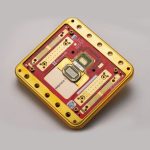
Majorana 1 – Microsoft’s Quantum Chip – Oracle Law Global
Oracle Law Global | Read the full article
Microsoft has recently introduced a groundbreaking quantum chip known as Majorana 1, which is about the size of a palm. This innovative chip utilizes a new kind of qubit called topological qubits, which are designed to enhance the stability and reliability of quantum computers. By harnessing a unique state of matter involving Majorana fermions—particles that can serve as their own antiparticles—this technology aims to minimize errors in quantum calculations, making it a significant step forward in the field of computing.
The Majorana 1 chip has the potential to transform various industries by solving complex problems more efficiently. For instance, it could lead to advancements in data security by creating highly secure encryption systems, making it extremely difficult for hackers to access sensitive information. Additionally, in the realm of drug discovery, this chip could enable scientists to simulate molecular interactions with remarkable accuracy, speeding up the development of new treatments for diseases. Furthermore, it could enhance artificial intelligence capabilities, resulting in faster and more effective algorithms.
While the Majorana 1 presents exciting opportunities, it also raises important questions regarding data protection and the regulation of such advanced technologies. As Microsoft enters the competitive landscape of quantum computing, where companies like Google and IBM are also vying for dominance, the implications of this technology extend beyond mere innovation. It invites a broader discussion about the future of technology and its impact on society, emphasizing the need for careful consideration of ethical and legal aspects as we move forward.

![The Quantum Leap: Innovations Driving the Future of Computing [English] The Quantum Leap: Innovations Driving the Future of Computing [English]](https://peeperfrog.com/wp-content/uploads/2025/04/2025-04-19T053530Z8641708329file-150x150.jpeg)
![NVIDIA Expands Quantum Computing Efforts with Taiwanese Manufacturers [English] NVIDIA Expands Quantum Computing Efforts with Taiwanese Manufacturers [English]](https://peeperfrog.com/wp-content/uploads/2025/05/2025-05-19T023402Z8685939127file-150x150.jpeg)